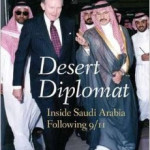U.S. Ambassador Robert Jordan: Desert Diplomat
On Wednesday, September 9th, the World Affairs Councils of America (WACA) hosted Ambassador Robert Jordan for a conference call as part of their Cover to Cover program. Ambassador Jordan recently released a book, Desert Diplomat: Inside Saudi Arabia Following 9/11. The discussion with the ambassador focused on his expertise and experience with Saudi Arabia and the Middle East.
One of the recurring topics during this call was the relationship between the U.S. and Saudi Arabia, from the fight against the Soviet Union, to the waning relationship after the Soviet conflict, and then the convening of both countries against Al Qaida and ISIS. When Jordan became ambassador, his first job was to determine if Saudi Arabia was a friend or foe. Although a majority of the perpetrators of the attack on 9/11 were Saudis, the ambassador said that Saudi Arabia is against Al Qaida, as the terrorist organization wants to topple the ruling royal family.
Ambassador Jordan also mentioned the communication (or sometimes lack thereof) between the U.S. and Saudi Arabia. In the beginning, according to the ambassador, there would be a lack of communication between various U.S. agencies, such as the CIA and the American embassy in Saudi Arabia, which resulted in a lack of communication between our two countries. Even now, he says, we may give assurances of our actions, but the tangible results are not always clear to the Saudis.
Another topic touched upon by the ambassador was how he came to be the U.S. ambassador to Saudi Arabia. When the 9/11 terrorist attacks occurred, there was no U.S. ambassador to Saudi Arabia. Ambassador Jordan describes practically taking a crash course in being an ambassador to be able to quickly fill the vacant position. When asked about the difficulty of learning so much in such a short amount of time, he said that it was “certainly a handful,” and that it was impossible to learn everything, but was grateful to the staff at the embassy for providing him with great support.
The last topic of the call was about Ambassador Jordan’s teaching experiences on the subject of the Middle East, as he teaches political science at the Southern Methodist University. The question to him was, “Are students passionate about the subject of the U.S. and the Middle East?” He said while there are still those who ask really good questions in his classes, there was far more interest several years ago. He brought up how there have been interesting class discussions between U.S. veterans, Arab students, and Jewish students, as various differing and conflicting viewpoints were heard.
Other things discussed briefly included:
- The U.S. invasion to Iraq and Saudi support – the ambassador stated that there was publicly no support, as they didn’t want to encourage regime toppling, but privately they provided logistical support
- The current crisis in Syria – how Saudi Arabia plans financial support but can’t provide more than that due to their involvement in Yemen, how the Saudis wonder if the S. even has a strategy in Syria, etc.
- And Saudi Arabia’s financial standing – the ambassador mentioned the increase of foreign investments into Saudi Arabia, as well as their growing presence at trade conferences
The aim of this conference call was to help aid in the clarification of the relationship between the U.S. and Saudi Arabia, both today as well as the past, particularly right after 9/11. While there were other points of discussion, it was interesting to hear the Ambassador’s take on this relationship, especially with his first-hand experiences. To learn more about the Ambassador’s involvement with Saudi Arabia, we highly recommend that you check out his book, which we have a link to down below.
For more information on WACA, click here.
For more information on Ambassador Robert Jordan, click here.
To order his book, Desert Diplomat: Inside Saudi Arabia Following 9/11, click here.
Written by: Danielle Ott, GCWAC Data and Web Management Intern Fall 2015 & Undergraduate Student at Northern Kentucky University studying Criminal Justice and International Studies


